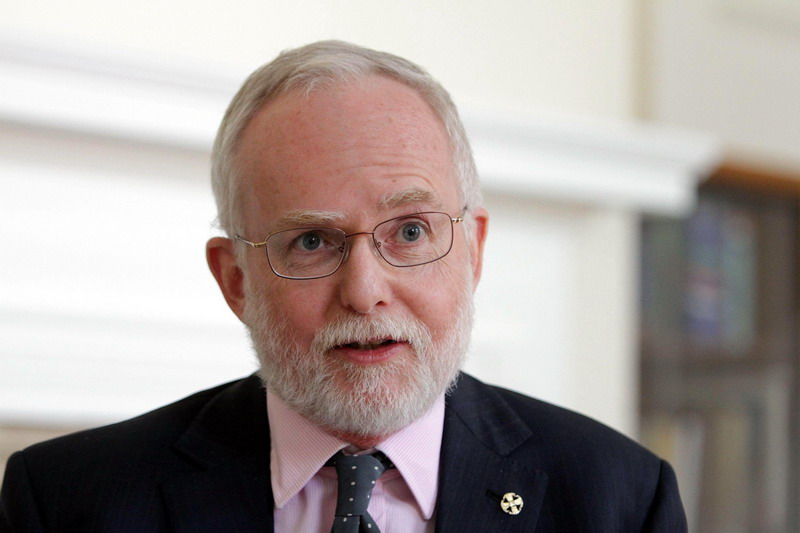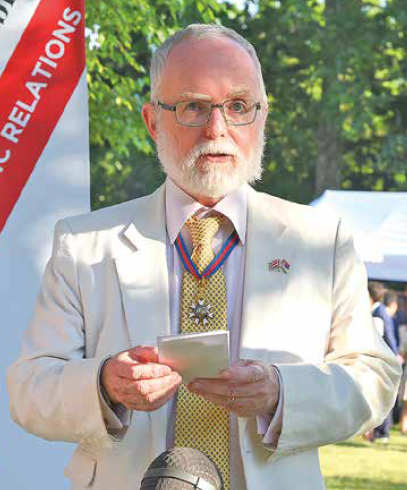We want to broaden our cooperation this year – the 180th since we established diplomatic relations. The importance of our close bilateral relations remains as important as ever

Over the course of this year and the celebrations we have organised as part of the 180th year I have been struck by just how long and deep our relations run. The event to mark exactly 180 years since the establishment of diplomatic relations in Kragujevac in June was a wonderful event and illustrated very well how much closer we are than one might think
Following Brexit, how do you now view the importance of Great Britain’s presence in Serbia, and the bilateral relations between the two countries?
› The importance of our close bilateral relations remains as important as ever, regardless of the realities of Brexit. As our Prime Minister and Foreign Secretary often say, we are leaving the EU but we are not leaving Europe and therefore our desire to see a safe, secure and prosperous Europe has not changed. And Europe of course includes Serbia. The UK presence in Serbia is as big as ever and will continue to be as we support the reforms that will bring about the integration of Serbia into the EU. Serbia has a key role in ensuring the stability of this region and we respect that through maintaining political interest, fostering cooperation and continuing financial support for key reforms. This year, we are celebrating an important jubilee – 180 years since the establishment of the diplomatic relations between Serbia and Great Britain.

How would you rate the current relations relative to the historical period behind us?
› Relations between Serbia and the UK are on the rise. Our Foreign Secretary and the new Serbian President enjoy a warm personal relationship, our Embassy is growing as we broaden and deepen our cooperation, and bilateral trade is growing in double digit percentage points each year. Nobody would deny that our relationship suffered at the end of the last century and the beginning of this one – and of course there are some areas where we still do not see eye to eye – but in relative terms our relationship today is much better. Of course, relations can always be better, and we hope to continue to develop that trend of improving relations as Serbia nears EU accession, as our bilateral trade and integration grows, and as our programme funds help Serbia to make important reforms. Over the course of this year and the celebrations we have organised as part of the 180th year I have been struck by just how long and deep our relations run. The event to mark exactly 180 years since the establishment of diplomatic relations in Kragujevac in June was a wonderful event and illustrated very well how much closer we are than one might think.
What impact do these redefined relations between the EU and Great Britain have on your involvement in Serbia’s accession to the EU?
› It is important to underline that until the UK formally leaves the EU we are a fully functioning member of the Union and will continue to play our full part, including enjoying all the rights and obligations that entails. That means that whilst the Article 50 negotiations continue – and until such a point that they are formally concluded – we will continue to support Serbia’s accession path and play a full
part in pushing for reforms and movement in the opening of Chapters of the Acquis. In reality, once we leave the EU we don’t anticipate that we will change our support for Serbia’s accession; we just won’t be part of the EU. We will continue – through mechanisms like the Good Governance Fund – to provide real support for real reform that support Serbia’s efforts to progress in areas crucial to its EU accession. These are all reforms that are important for Serbia to make in of themselves, for the good of its citizens, not just for the sake of accession to the EU. Ultimately, successful reforms would mean a better court system, less corruption, less bureaucratic government institutions, a better environment for business, a better natural environment, and freer media to reference only a few. Quite simply, we want Serbia to achieve all of these things, so we will continue to support its EU accession.
Do you think that Britain leaving the EU will encourage eurosceptics that are vocal in Serbia too?
› As I said at the beginning of the interview, the UK is not leaving Europe. This may sound like semantics, but it is important. The EU is part of Europe, so it follows that we want the EU to prosper when we leave. It is not in our or anyone else’s interests to weaken the EU, as that will weaken Europe. Of course, the fact that we are leaving may well encourage others who want to pursue their own aims, but we will continue to support Serbia on its path towards the European Union, and we continue to think that Serbia’s interests are best served through joining the EU. In the last two years, through its Good Governance Fund, Great Britain has been lending support to the tax administration and judicial reforms in Serbia.
Why is Serbia’s progress in these areas still relatively slow?
› Serbia has a lot to reform, and good reforms are only ever done carefully and thoroughly. It would be wrong for us to suggest that we wouldn’t like progress to come more quickly, but reform of institutions such as the tax administration and the judiciary take time to get right. We hope that with the promotion of Ana Brnabic to the position of Prime Minister – and given her energy in pushing crucial reforms in Serbia – we will now see greater impetus in making these critical changes, all with the full support of the UK Government. At my meeting with Ana in early July, we agreed that we would continue to work closely together, as we had done when she was Minister of Local Government and Public Administration. She welcomed the UK’s role through the Good Governance Fund (GGF) in
supporting reform and we are happy to continue to do so. Apart from the EU integration process, Serbia and Great Britain have been cooperating on a number of issues – from political reforms and conflict prevention to collaborating in defence, commerce and investments, as well as in fighting organised crime.
What do you think are the top priorities in regard to this cooperation at the moment?
› We want to broaden our cooperation this year – the 180th since we established diplomatic relations. In the light of the awful attacks in Manchester and London, our key priority in cooperation with the Serbian Government will be on fighting terrorism and organised crime. My team working on these issues in the Embassy is growing and we continue to enjoy good cooperation with the Minister of Interior, Nebojsa Stefanovic, and his team. In defence, we want to develop our relationship, adding value where we can – the joint operation Platinum Wolf in June was one such excellent example. We also want to support Serbia in promoting regional stability and prosperity. So we will continue, through our multi-million pound Good Governance Fund, to support Serbia in encouraging connectivity and investment in the region, whilst making the internal reforms that are good for Serb citizens. Those reforms will also encourage investment from British companies that see greater stability and security in the business environment. With the Western Balkan Summit to be held in London in 2018, we are keen to take forward the work already done by our partners in Berlin, Paris and Rome. This means providing real support for regional integration and development, including on digital connectivity, youth and security. This will feature strongly in our development support leading up to July 2018.
How much did Serbia progress in the economic reforms in the last three years in terms of becoming more of a market economy?
› Progress in economic and fiscal reform has been one of the key successes in recent years for Serbia. The decision to invite the IMF in, and to stick to the Standby Arrangement, was a very important one. The reforms that Serbia has made in keeping with that agreement, alongside a real desire to improve the business environment and to encourage foreign investment has meant that Serbia now looks much more like a fully functioning market economy than it did before. The work done to reduce the fiscal deficit and stabilize public debt has contributed to increased confidence in Serbia and calmed fears on financial markets. The continuing work on loss-making state-owned enterprises and companies in bankruptcy proceedings has shown that it is possible to turn around these seemingly intractable problems with hard work and dedication. But much more needs to be done – a lot of the quick wins have already been made. A functioning market economy also needs a stable, fair and reliable rule of law environment. The other reality is that the rest of the world does not stand still. Serbia needs to maintain this momentum; there is no room for complacency.